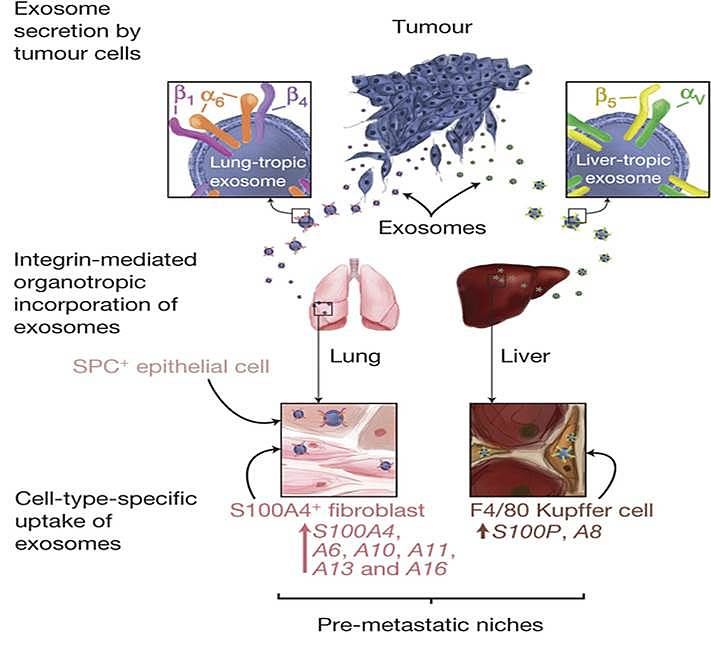David C. Lyden, Professor of Pediatrics
Invention Summary
This invention provides methods and reagents to predict potential and sites of metastasis in a cancer patient and methods and reagents to prevent or treat metastasis with integrin inhibitors or inhibitors of the activated S100 molecules.
Technology Overview
Stephen Paget first proposed the “seed-and-soil” hypothesis in 1889 that organ distribution of metastases is a non-random event. Experimental metastasis assays provided support for Paget’s organ-specific metastasis theory, but a deeper understanding of the molecular basis of organ-specific metastasis is essential for prognosing metastasis and provided potential therapeutics.
Exosomes are small membrane vesicles containing functional biomolecules. Cornell researchers demonstrated that molecules present on tumor-derived exosome are “addressing” them to specific organs. The researchers revealed that distinct integrin expression patterns are associated with organotropic metastasis: exosomal integrins α6β4 and α6β1 are associated with lung metastasis while exosomal integrin αvβ5is linked to liver metastasis (Fig. 1). The researchers confirmed these findings by exosome proteomics for 28 organ-specific metastatic cell lines.
The researchers also showed that tumor-derived exosomes uptaken by organ-specific cells prepares the pre-metastatic niche and activates Src phosphorylation and pro-inflammatory S100 gene expression (Fig. 1). Targeting the integrins decreases exosomal uptake, as well as lung and liver metastasis. Their clinical data also demonstrated that exosomal integrins in cancer patient plasmas correlate with and predict likely sites of metastasis.
This study, published in Nature, provides potential biomarkers for prognosing metastasis and also provides potential therapeutics for the treatment and prevention of metastasis.
Potential Applications
- Predict potential and sites of metastasis with integrin expression profiles in circulating plasma exosomes
- Treat or prevent metastasis based on the integrin profile expressed on the tumor derived exosomes with a therapeutic integrin inhibitor
- Treat or prevent metastasis with inhibitors of S100 molecules
Advantages
- Easy and non-invasive prognosis - exosomal samples can be obtained noninvasively and repeatedly from specimens such as blood and urine
- Metastasis can be prevented or treated before the metastasis sites are established, which is essential for patients’ survival

Figure 1: tumor-derived exosomes uptaken by organ-specific cells prepares the pre-metastatic niche and activates Src phosphorylation and pro-inflammatory S100 gene expression
Publications
Intellectual Property
Cornell Reference
- 7003
Contact Information

For additional information please contact
Brian Kelly
Director, Business Development and Licensing
Phone: (646) 825-2766
Email: bjk44@cornell.edu

